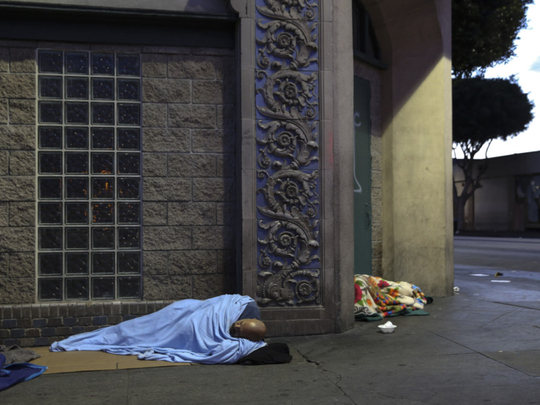
PARIS: “If you could help this couple who are living in the street. Their number is on the sign. ...”
This tweet, accompanied by a snapshot of Robert and Emilia, two homeless 70-somethings, holding each other in their arms on their Parisian bench, with a poodle and a suitcase as their sole possessions, worked miracles: more than 22,000 retweets, hundreds of emotional comments and, most importantly, dozens of offers for accommodation.
On their suitcase, Robert and Emilia had pasted a sign that had their cellphone number and offered “small jobs” in exchange for money. The day after the tweet was posted, Robert, a former locksmith, had his voice mailbox saturated with messages, his phone ringing constantly, and a bunch of keys in his pocket. “We were offered a studio apartment for the winter, rent-free,” he says, his voice rich with emotion. “Also, my former boss recognised me and wants to hire me back, which is good because I’m in great shape. Somebody else also wants to offer us an entire set of household appliances.”
For several months, Robert and Emilia had been sleeping in a makeshift hut on the banks of the river Seine, just outside of Paris. After a life spent working hard - “but not always legally, I messed up,” Robert admits - it turned out the two hadn’t worked enough on the books to qualify for a pension. So they had to survive out on the street. In one day, Twitter changed their destiny. And after 48 hours, an online collection pot in their name had already brought in some 800 euros.
A similar event took place in the northern French city of Lille, after a passerby posted on social media the photo, story and cellphone number of Alexandre, a 40-year-old former warehouseman who had been living in his car for four months, after going down a spiral of economic layoff, end of unemployment benefits and home eviction. He too was inundated by phone calls the same evening. “People were calling me from all over France, to offer me some place to stay, invite me for a meal,” Alexandre recalled. “It’s incredible: People avoid looking at you in the street, they don’t talk to you, but on social networks there’s an incredible generosity.”
Edouard Hermet works for the online media Sans A_, whose goal is to make “the invisibles visible” and make it go viral. “Social media is putting human faces and names back on misery,” he says. “We often talk about those who have to sleep out in the street in generic terms, by saying ‘the migrants,’ ‘the homeless,’ and that dehumanizes them. These people have an individual story, some have even had extraordinary lives until something went wrong. And showing people sparks their awareness.”
According to a report from one of France’s leading charities, the Abbe Pierre foundation, the number of French people living in the street has gone up by 50% in 10 years, and 4 million people live in substandard housing, meaning they’re either being accommodated by third parties, living in their cars or simply on the sidewalk.
In Paris, this poverty is now visible on almost every street corner. Families with young children lying down on filthy mattresses here, a 65-year-old couple like Robert and Emilia there. ... According to the Red Cross, some 2,000 elderly people are believed to be sleeping rough. In this context, the digital world becomes an accelerator of spontaneous solidarity. There is, for instance, this new app, Entourage, which offers to “recreate bonds with the homeless in your neighborhood” by showing users their concrete and geolocalized needs: a free hot coffee offer, somewhere to do the laundry, and so on.
“The younger generation is shaking things up by giving solidarity a huge impact through social media, which enables people to pool competences to concretely help the homeless,” says Edouard Hermet. “While big associations often offer one-size-fits-all solutions, we can announce on Twitter or Facebook who actually needs what. Jean-Claude’s dream, for instance, was to have a fishing rod, and somebody sent him one in a record time.”
Extreme poverty
The platform Sans A_ was created five years ago by a 17-year-old who was moved by cases of extreme poverty in France. Since then, the startup has been publishing video portraits and podcasts about some of these people and their stories. It has close to 20,000 followers on Facebook and their work is seen by about 70,000 people.
Last year, Sans A_ published a portrait of Jean-Claude, a 65-year-old homeless man in Paris who told viewers of his life in the street. “What gets on my nerves is when people stop to look at you as if you were a circus freak,” he said in the video. “When they look at me that way, I tell them: Why don’t you take photos while you’re at it and put them on your fridge or your bedroom, that way you’ll see me everyday.” And after that they’d leave.
“I prefer not being talked to, or not being looked at altogether.”
Sans A_ had managed to raise 5,000 euros for him to find accommodation for the winter. An association, Emmaus, then took over and was able to find a long-term solution for him. But traditional channels are increasingly overwhelmed by demand.
Numbers
- 50%: increase in number of French living on the streets in 10 years
- 2,000: elderly people believed to be sleeping rough in Paris, according to Red Cross
- 4 million: people in France live in substandard housing
New York Times












